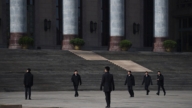【新唐人2013年11月02日讯】11月中共将召开十八届三中全会。最近,官方智囊机构提交了一份改革方案,试图改善企业和政府之间的关系。但评论指出,这一所谓“改革路线图”本来是早在20年前就该实施的,拖到今天已经毫无新意,而且现在民众对中共已经彻底失去信心,因此这一路线图不会给中国社会带来根本性的变化。
日前,中共“国务院发展研究中心(国研中心)”首次对外公开了这一改革方案全文。大陆媒体报导,路线图由国家发展改革委副主任刘鹤和国研中心主任李伟领衔担纲。
这份提交给中共十八届三中全会的改革方案报告,被称为“383”改革方案,也就是所谓:“三位一体改革思路、八个重点改革领域、三个关联性改革组合。”
报告说,“三位一体”是指推动完善市场体系、转变政府职能、创新企业体制。这其中的关键在于“正确处理政府和市场的关系”,为此必须推动行政管理体制、垄断行业、土地制度、金融体系、财税体制、国有资产管理体制、创新体制以及对外开放等八个重点领域的改革。
报告谈到,中国的经济和社会发展存在深层次体制和政策的弊端,因此今后几年必须在深化改革上取得实质性进展。
北京大学经济学教授夏业良:“我对这个不抱很大的期望。因为只不过是在做一些20年前就承诺但是没有兑现的事情。”
夏业良认为,当局早已经错过了实施这一方案的最好时机,目前整个社会环境也已经今非昔比,在不触动政治体制的情况下,经济领域进行所谓的改革开放并不能改变全局。这其中有一个关键因素是:企业家和老百姓都已经对中国社会的现实彻底失去信心。
多年来,大陆司法体系的黑暗导致投资环境越发恶化,很多企业家被当局以“打黑”等各种名义抓捕判刑,这促使越来越多的企业家设法逃离大陆、移民海外。
今年7月,当局将湖南湘西民营企业家曾成杰以“非法集资罪”秘密处死,引发公众强烈不满。10月21号,大陆民营企业家、“鼎辉投资”创始人王功权被当局以“扰乱公共场所秩序”为名批捕,外界质疑,王功权是因为长期关注公益事业而遭到当局打压。这类事情的不断出现,无疑将使企业家的逃离大潮越演越烈。
中国思源兼并与破产咨询事务所所长曹思源:“现实当中有很多的司法不公正,这些不公正的现实使人们思考,原因何在?”
美国中文杂志《新纪元》周刊曾报导,中共十八届三中全会有可能改变中国现行的司法和反腐体制。这可能包括两个措施:一个是,建立纪检监察的大部门制。一个是,从同级监督变为提级监督。同时,法院与检察院也将不受地方政府管治。
曹思源:“我在19年前就提出来,法院要独立审判,法院要受最高法院垂直领导。这样就能解决司法的地方保护主义问题。”
不过,《新纪元》周刊也援引一位北京律师的话指出,地方法院即使不受地方政府的领导,仍然受到中共的直接控制,在一些中共认为危害自身的案件上,比如对有关异议人士和信仰团体案件的审判,法院仍然将遵从中共的指示,因此这种所谓的改革也只是“换汤不换药”。
采访/常春 编辑/李谦 后制/萧宇
Chinese Communist Party Think-Tank Presents Reform
Plan For The Plenary Session 20 Years Too Late
This month, the Chinese Communist Party (CCP) will hold
its 3rd Plenary Session of the 18th Central Committee.
Recently, a party think-tank presented a reform plan to
improve relations between the CCP and Chinese enterprises.
However, some remarked that such a “reform route" should
have been implemented as early as 20 years ago.
By putting it off for such a long time there is nothing
exciting left in the plan.
As most Chinese people have lost their confidence in the
party, this reform blueprint won’t make any real changes.
Recently the CCP’s Development Research Center of the
State Council announced the full text of a reform plan.
According to Chinese media, this plan was worked out by a
group led by Liu He, vice director of National Development
and Reform Commission, and Li Wei, Research center head.
This report is also called the “383 reform plan", prepared for
the next 3rd Plenary Session of the 18th Central Committee.
“383″ means: three-in-one reform concepts, eight key fields
for reform, and three relevant reform packages.
The report says the “three-in-one reform" means improving
the market system, converting government functions and
introducing new structures to business units.
The key to this reform lies in “properly handling the
relations between government and market".
To accomplish this, the report claims that it is necessary
to push forward reforms in the following eight key fields:
Administrative framework, monopolized industries,
land policy, financial system, tax system, management of
state-owned properties, innovation acceleration
and openness of the state.
The report says China’s economic and social development is
encountering serious problems from its regime and rules.
As a result, real improvement must be made in the next
few years on deepening the reform.
Xia Yeliang, Professor of Economics at Peking University:
“Personally I don’t expect much from this plan because it’s
simply trying to do something that was promised 20 years
ago but had never been done."
Xia Yeliang, believes that the CCP has missed the
best time to carry out the reform plan.
Now the overall social environment is no longer
what it was before.
Without touching the political framework it is not possible
for reforms in economic fields to change the whole picture.
A key factor here is that, most Chinese people and business
owners have totally lost confidence in any improvements
of China’s current situation.
Over the years, the darkness of China’s judicial system has
continuously made the environment for investment worse.
Many entrepreneurs were imprisoned or convicted by the
CCP with false excuses such as the “Striking black" campaign.
This has driven more and more entrepreneurs to
escape mainland China through emigration.
In July, Hunan businessman Zeng Chengjie was secretly
executed by the CCP which outraged the Chinese public.
On October 21st, Chinese private entrepreneur, founder
of Dinghui Investment was officially arrested on charges
of “disrupting order in a public place".
Outsiders doubt that that was suppression by the party
over Wang’s consistent efforts on social benefit issues.
As such issues arise one after another, the “emigration
wave" of business people will definitely increase.
Cao Siyuan, President of Beijing Siyuan Consultancy:
“In reality there are so many judicial injustices that people
have to think what the causes are of for all those cases."
The US-based Chinese magazine Epoch Weekly reported that,
the CCP’s 3rd Plenary Session of the 18th Central Committee
may bring changes to the current judicial and anti-corruption
system in China.
There are two possible changes: first, to establish a single
but huge department for discipline inspection.
Second, implement supervision from superior-level
instead of peer-level.
Also courts and procuratorates will no longer
follow instructions of local governments.
Cao Siyuan:"19 years ago I presented the idea of independent
court trails and direct leadership of the Supreme Court overall.
This can solve the problem of regional protectionism
in the current judicial system."
On the other hand, the Epoch Weekly’s report also cited
words from a Beijing lawyer that, even if local courts are
no longer led by local governments, they are still directly
controlled by the party.
In cases that the CCP regards as a threat to itself, such as
trials of dissidents and members of belief groups, courts still
follow the instructions from the party.
In conclusion, such a reform can only be a superficial one
without bringing any fundamental changes to the regime.

























